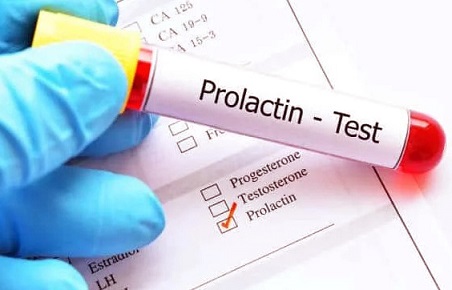Nikhil Prasad Fact checked by:Thailand Medical News Team Oct 20, 2024 1 year, 3 months, 1 week, 6 days, 5 hours ago
Health News: A recent study from Poland has revealed a concerning connection between low levels of the hormone prolactin in men and an increased risk of cardiometabolic diseases. The study explores how low prolactin impacts men's health, focusing on metabolic and cardiovascular complications. The findings emphasize the importance of monitoring hormone levels in men receiving specific treatments like dopamine agonists, which can significantly alter prolactin levels.
 Prolactin Deficiency in Men Linked to Increased Heart and Metabolic Risks
Prolactin Deficiency in Men Linked to Increased Heart and Metabolic Risks
The research was led by a team from the Department of Internal Medicine and Clinical Pharmacology and the Department of Pediatrics in Bytom at the Medical University of Silesia in Poland. The study involved men with prolactin deficiency caused by the drug cabergoline, commonly used to treat conditions like hyperprolactinemia, a condition characterized by excessive prolactin production. The researchers found that men with lower prolactin levels were at higher risk of developing issues such as type 2 diabetes, high blood pressure, and heart diseases.
Understanding the Study
The researchers conducted a pilot study involving three groups of men, all aged 20 to 65. The first group consisted of men with cabergoline-induced prolactin deficiency (hypoprolactinemia), the second included men who had normal prolactin levels after receiving cabergoline, and the third group served as the control, comprising men not treated with dopamine agonists.
As part of the study, the researchers measured various factors, including body mass index (BMI), fat content, blood pressure, and several blood markers like glucose, insulin, and cholesterol levels. This
Health News report delves deeper into the study's findings, showing how low prolactin levels correlate with increased cardiovascular risk factors, including elevated blood pressure, body fat, and cholesterol, and how prolactin normalization improved these conditions.
Key Findings: Low Prolactin and High Risk
The study revealed significant differences between the three groups. Men with hypoprolactinemia were found to have higher body fat, larger waist circumferences, and higher systolic blood pressure than men with normal prolactin levels. In addition, their fasting blood glucose, HbA1C (a marker of long-term blood sugar control), and insulin resistance were elevated, indicating a higher risk of type 2 diabetes.
Other alarming findings included increased levels of inflammatory markers such as high-sensitivity C-reactive protein (hsCRP) and fibrinogen in the prolactin-deficient men. These markers are well-known indicators of cardiovascular disease. Furthermore, prolactin-deficient men showed higher levels of homocysteine, a compound associated with heart disease, and uric acid, which can increase the risk of gout and other metabolic issues.
Interestingly, men with lower prolactin levels also had lower levels of HDL cholesterol, the "good" cholesterol that helps remove fat from the bloodstrea
m. Additionally, testosterone levels were lower in men with prolactin deficiency, which may contribute to sexual health issues such as decreased libido and erectile dysfunction.
Normalization of Prolactin Leads to Improvements
The good news from this study is that many of these risk factors improved when prolactin levels were restored. Men who had their cabergoline dosage reduced to normalize prolactin levels experienced a drop in systolic blood pressure, fasting glucose levels, and inflammation markers like hsCRP and fibrinogen. Their HDL cholesterol levels also increased, which is beneficial for heart health.
However, despite these improvements, some risk factors, such as BMI and waist circumference, did not significantly change after six months of normalized prolactin levels. This suggests that while prolactin plays a crucial role in managing cardiometabolic health, other factors, such as long-term lifestyle habits and underlying genetic predispositions, might still influence a person’s health outcomes.
Why Prolactin Matters
Prolactin, a hormone most commonly associated with lactation in women, also plays a crucial role in men’s health. It influences mood, sexual function, and metabolic processes, including insulin sensitivity and fat metabolism. When prolactin levels are too low, men may experience mood disturbances, reduced sexual desire, and an increased risk of developing metabolic syndrome - a group of conditions that raises the risk of heart disease, stroke, and diabetes.
This study contributes to a growing body of research suggesting that prolactin deficiency in men should not be overlooked. The researchers argue that prolactin deficiency should be considered a distinct medical condition, particularly in patients receiving treatment with drugs that affect dopamine, like cabergoline.
The Implications of the Study
The results of this study raise important questions about how prolactin levels should be managed in men undergoing treatment with dopamine agonists. The findings suggest that while drugs like cabergoline are effective in managing conditions like hyperprolactinemia, they need to be carefully monitored to avoid pushing prolactin levels too low, potentially creating a whole new set of health risks.
The research highlights the importance of balancing hormone levels and suggests that clinicians should monitor their patients’ prolactin levels regularly to avoid the development of hypoprolactinemia and the associated health risks. Moreover, doctors may need to consider alternative treatments or dose adjustments in patients who develop prolactin deficiency.
Conclusion
In conclusion, the study demonstrates that low prolactin levels in men, particularly those induced by treatments like cabergoline, can significantly increase the risk of cardiometabolic diseases. This condition is reversible, as shown by the improvement in risk factors once prolactin levels are normalized.
However, the findings also suggest that even after prolactin normalization, some health risks, such as increased body fat and a higher BMI, might persist. Therefore, managing prolactin levels should be part of a broader strategy to reduce cardiometabolic risks in men.
In light of these findings, the researchers recommend that men receiving treatments affecting prolactin levels should be closely monitored for any signs of prolactin deficiency and associated cardiometabolic risks. Further research is also needed to explore potential treatments for prolactin deficiency and its long-term health consequences.
The study findings were published in the peer-reviewed journal: Biomolecules.
https://www.mdpi.com/2218-273X/14/10/1335
For the latest
Health News, keep on logging to Thailand Medical News.
Read Also:
https://www.thailandmedical.news/news/new-study-finds-that-urban-men-outlive-their-rural-peers
https://www.thailandmedical.news/news/revolutionary-male-contraceptive-gel-finally-unveiled
